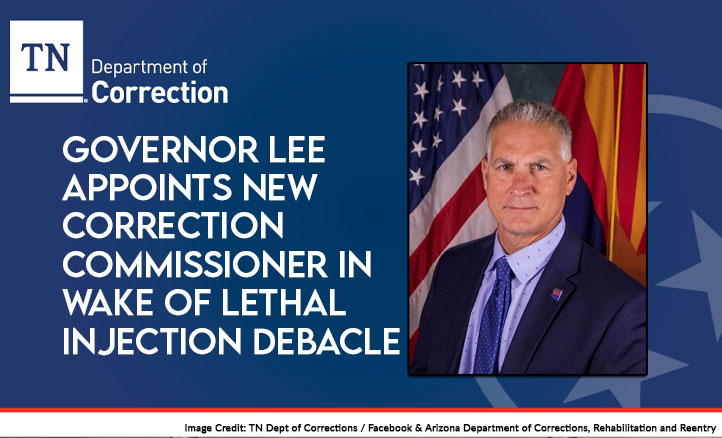Marks first move to shore up execution protocol.
Image Credit: TN Dept of Corrections / Facebook & Arizona Department of Corrections, Rehabilitation and Reentry
By Sam Stockard [Tennessee Lookout -CC BY-NC-ND 4.0] –
A week after unveiling a report displaying incompetence in the state’s lethal injection program, Gov. Bill Lee appointed an Arizona prison official who oversaw a renewal of executions there to lead Tennessee’s prison system.
Frank Strada, deputy director of the Arizona Department of Corrections, will replace interim Commissioner Lisa Helton this week as the governor marks off one of his steps for fixing the state’s lethal injection protocol.
The governor put a hold on executions in May after finding out the state failed to follow guidelines on the testing of lethal injection drugs, stopping the execution of death row inmate Oscar Smith one hour before he was to be put to death.
“I commend Lisa’s (Helton) strong leadership as interim commissioner and appreciate her continued service to the department,” Lee said in a statement. “Frank’s extensive corrections management and law enforcement experience make him well-suited to lead the Department of Correction, and I am confident he will serve Tennessee with integrity.”
In Arizona, Strada handled prison operations, inmate programs, public affairs, facilities management and financial services for four years. He also oversaw three 2022 executions in Arizona by lethal injection, marking the first execution there in eight years, a delay caused by a botched lethal injection, according to reports.
But in all three of the 2022 executions, Arizona Department of Corrections officials “struggled” to properly place needles delivering lethal injection chemicals, according to the The Arizona Republic. In both the June 8 execution of Murray Atwood and the November 16 execution of Murray Hooper, prison staff had trouble inserting an IV in the men’s arms to administer the lethal dose but eventually the doses was made through the femoral artery of the leg.
Strada has 34 years of experience in the corrections field, including nearly three decades with the Federal Bureau of Prisons, where he led 121 institutions and advised the bureau’s director. Helton, who replaced Tony Parker in December 2021, is to continue working as assistant commissioner for community supervision in the department.
Strada is the second corrections official in less than a week to depart Arizona for the top job in another state. Arkansas Gov. Sarah Huckabee Sanders tapped Joe Profiri, deputy director of the Arizona Department of Corrections since 2018, to lead Arkansas’s correction agency.
The appointment comes a week after the governor released a third-party review of the state’s lethal injection operations by former U.S. Attorney Ed Stanton.
Based on the review, Lee said he planned to shake up the department’s leadership, hire a permanent commissioner this month, require department leaders to revise lethal injection protocol in consultation with his office and the attorney general and order new leadership to review training for the revised guidelines.
Lee issued temporary reprieves for five executions in May after finding out the department failed to follow lethal injection rules put into place in 2018.
Among the findings, the review determined there was no evidence the state provided a copy of its protocol to the pharmacy hired to test its lethal injection chemicals.
The report also found the state didn’t follow protocol in several executions, failing to properly test drugs before executions took place, mishandling drugs and preparing to use defective drugs for at least one execution.
The ACLU of Tennessee recently called the report “disturbing” and said it displays “the danger that arises when government operates in secrecy.”
“The state was fully prepared to execute seven people using improperly tested, and at times defective, drugs that create the sensation of drowning or burning alive – in the name of Tennesseans,” ACLU of Tennessee Executive Director Kathy Sinback said in a statement. “Because of state laws that allow secrecy in execution protocols, these horrific errors would not have come to light had the governor not ordered this investigation.”
ACLU Tennessee, which contends the death penalty is unconstitutional and a failed government program, called for a moratorium on executions while the governor continues to review a “broken system.” It also encouraged the governor to find “more effective ways” to protect public safety.
Chemicals that were to be used in the April execution of Smith were tested for potency and sterility but not for endotoxins.
Evidence further showed lethal injection chemicals used to execute Billy Ray Irick in August 2018 were not tested for endotoxins, nor was the drug Midazolam tested for potency.
The report also found that when the state put Edmund Zagorski to death in November 2018 using electrocution, the lethal injection chemicals prepared as an alternative if he changed his mind were not tested properly. Similar errors were made in the executions of David Earl Miller, Stephen West, Lee Hall and Nicholas Sutton, who all chose electrocution.
The lethal injection chemicals used in the execution of Donnie Edward Johnson weren’t tested for endotoxins, either, according to the review.
The report lays the blame at the feet of leaders in the Department of Correction.
“The evidence shows that TDOC leadership placed an inordinate amount of responsibility on the drug procurer without providing much, if any, professional guidance; resources; or assistance,” the report states. “Instead, TDOC leadership viewed the lethal injection process through a tunnel-vision, result-oriented lens rather than provide TDOC with the necessary guidance and counsel needed to ensure that Tennessee’s lethal injection protocol was thorough, consistent, and followed.”
The report shows the drug procurer hired by the state is responsible for obtaining lethal injection drugs to be used in executions but that neither the position nor the responsibilities are defined in “any iteration” of the protocol.
Under instructions from former Commissioner Parker, the department’s deputy commissioner/general counsel picked the current drug procurer in 2016. The drug procurer, which is not named in the review, described it as an “off the books” role because obtaining the drugs was not its only responsibility with TDOC.
Before the company took that role, the state used a lethal dose of one drug, Pentobarbital, in executions. Parker instructed the drug procurer to find a new source for the drug, but it had trouble locating a supplier because pharmacies and manufacturers didn’t have the quantity of the chemical Tennessee requested or didn’t want to be associated with lethal injection executions.
The state also sought the drug from an international supplier but ultimately decided the U.S. Drug Enforcement Agency would not allow Pentobarbital, a schedule II drug, to be imported.
Thus, the department opted for a three-drug lethal injection, even though TDOC officials told the reviewers that the one-drug injection had a lower risk for error.


About the Author: Sam Stockard is a veteran Tennessee reporter and editor, having written for the Daily News Journal in Murfreesboro, where he served as lead editor when the paper won an award for being the state’s best Sunday newspaper two years in a row. He has led the Capitol Hill bureau for The Daily Memphian. His awards include Best Single Editorial from the Tennessee Press Association. Follow Stockard on Twitter @StockardSam


